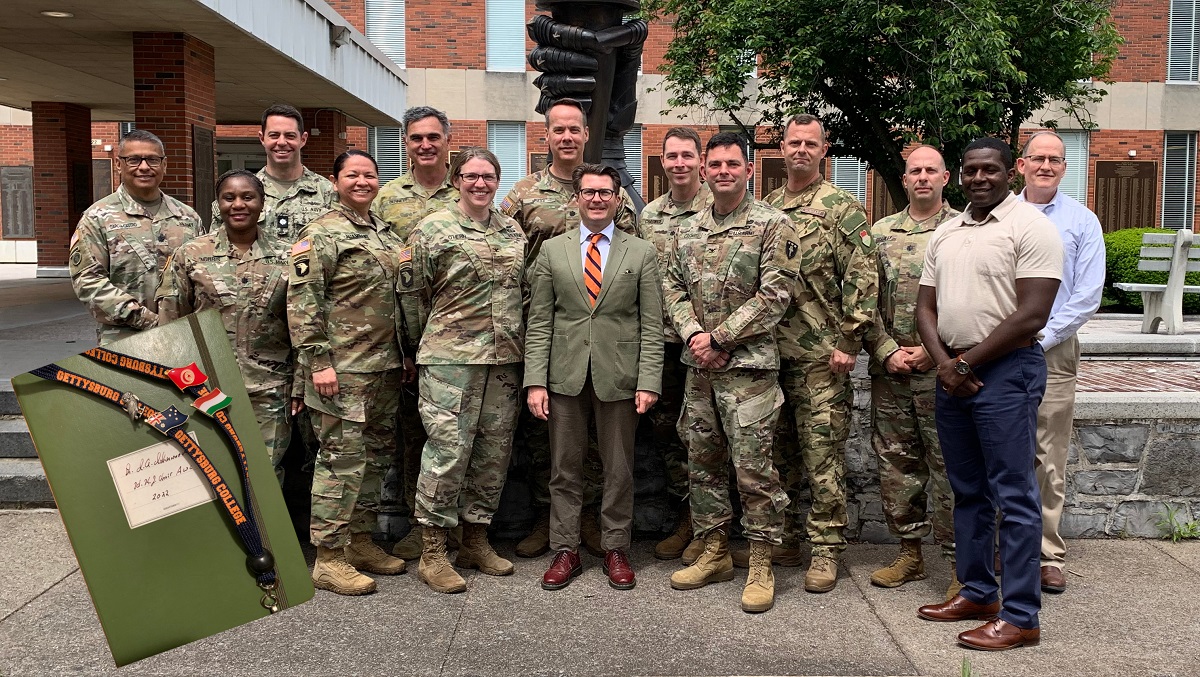
“The object in war is to attain a better peace – even if only from your own point of view.”
Basil Liddell Hart
The phrase “a better peace” is well worn on the sleeves of strategic scholars. The second part of Basil Liddell Hart’s quote is just as important. It gets at the heart of the narratives told in war and peace. Part of knowing “your own point of view” is understanding historical memory—of the stories you tell yourself about the past, as well as, the stories told by your adversaries.
I was no stranger to Liddell Hart before my tenure at the Army War College, but most of my thinking about the British sage of strategy came through the indirect approach of World War historiography. As a former junior officer in the Great War and as a prominent military intellectual in his lifetime, Liddell Hart attracted debate and controversy with members of his generation, many of whom were fellow veterans. His papers contain a vast correspondence with key figures of that era and are an extremely valuable repository on not only military and strategic affairs, but also about society and culture in mid-century Britain.
Liddell Hart and his generation knew not only the painful sting of war; they also knew what it was like to live in a society deeply in mourning and forming a culture of remembrance to understand the trauma of the Great War. More than a hundred years on, it is still hard to comprehend the depths of suffering brought by that war and its terrible ramifications on world history.
When Liddell Hart wrote about the idea of a better peace, he was writing within the context of the catastrophic failure of peacemaking in his lifetime. He was also writing with the pragmatic insight that wars often continue long after the peace in the memories of the societies that wage them. After all, he became a soldier-turned-author who used his writings to shape public understanding about war.
Soldiers, Memory, and History
Since Thucydides soldiers have put down swords and taken up the pen to shape the legacy of the wars that they have fought. In doing so, they also shape the history and future of wars as they are understood by the public. This was the subject of my elective at the Army War College, The Long Shadow: How Wars are Remembered and Why it Matters. Our seminar looked at five conflicts—the Civil War, the First World War, the Second World War, the Vietnam War, and the Global War on Terrorism—and examined how each war generation understood their experiences, and then how societies in turn have remembered each conflict.
The overall point of the course was to get strategic leaders to focus on the intersection between history, experience, and memory, and to understand that the way societies remember their wars shapes that society’s views toward war, peace, the military, veterans’ affairs, etc. In short, the memory of the last war acts as a prism, reflecting memory toward the next war (and often wars after that). The war generation of each conflict takes an active and formative part in framing the memory of their wars.
As the term “collective memory” implies, there is a version of past events that a certain group wants to remember in a certain way. Tied to the concept of collective memory is the selective forgetting of facts and events that do not fit the interpretation that a group wants to remember. As David Lowenthal writes in The Past is a Foreign Country, “Memories must continually be discarded and conflated; only forgetting enables us to classify and bring chaos into order.”
History is messy and chaotic; memory narratives often makes sense of the chaos, “even if only from your own point of view.” Stories about the past have deep emotional connections to identity and have a polemical purpose in the present: to commemorate, to instruct, to warn, to justify, etc.
In my course we dissected the stories told about war beginning with soldier experiences and continuing through the social and political process of understanding the legacy of wars. As a “pure civilian” academic who has spent my entire career at a leafy liberal arts college, I know nothing personally about the experience of war; but as a scholar of war stories, I know a bit about how people write about war. So, part of this class was to get Army War College students to read and think about how soldiers in the past interpreted their own experiences—memorialized them in print and in granite—and to examine how those experiences helped to frame the public’s understanding of wars.
As each war generation interprets its experiences, it seeds the next generation’s perceptions of war.
Again and again my students drew parallels between their own experience and the readings and asked hard questions from history. The work was difficult but rewarding and my students understood that the ramifications of violence are vast, conflicted, contentious, and lasting through the generations. As each war generation interprets its experiences, it seeds the next generation’s perceptions of war. For students who have served through two decades of American wars, these themes were compelling.
The “Carlisle Experience” causes officers to reflect on their careers as they look forward to the next step. It is a brief, albeit busy, intellectual moment of breathing space in busy careers. Reading and reflecting upon how other soldiers have made sense of their experiences adds an element of context for that service. In a seminar setting students can enrich not only perspective on their career looking backwards, but also the shape of the career (and life) ahead to come.
Their generation will shape the public narrative of the Global War on Terror and the future of civil military relations in a society trying to make sense of those conflicts. At its most fundamental level, a better peace for our nation’s veterans means finding ways of telling the stories of our recent and future wars to preserve them and to warn those in the future of the costs of the failures of peace.
Historical Memory as a Strategic Concept
Historical memory is not only about soldiers’ stories, but it is also how whole societies remember significant historical events and the power those events have on the present. I didn’t appreciate enough that memory is a strategic concept until I got to the war college and started using the word “strategic” in every other sentence. Within the War College curriculum, historical mindedness and strategic empathy are essential arrows in the quiver of the future strategic leader. Cutting across both is the idea of memory because it bridges the past and present and helps us understand not only our own history as it relates to current events, but also gives us a lens to understanding our potential adversaries’ worldview within a broader context.
Historical memory functions by invoking the past to present an argument in the present. That understanding of the past can be based on reality or it can be imagined. Whether it is the Athenian speechmakers in Thucydides or modern-day leaders at a press briefing, the past is often politicized, even if based on historical reality. Stefan Berger writes in History and Identity, “Historians of memory have recognized that memories of the past have an important impact on the diverse ways in which the past becomes both meaning and powerful in the present and in which it is capable of shaping the future.” It is memory’s power in the present and its ability to influence the future that makes it relevant for strategic leaders.
War as it happens and war as it is remembered by societies can be very different. As such, our understanding of a nation’s history means little if that understanding diverges. Often interpretations of the past are state-sponsored and created for political purposes; sometimes they are deeply cultural and concern matters of identity important to a particular society. Understanding how history is interpreted and used by a society as it looks towards the future is just as important as understanding history itself.
Part of historical mindedness is knowing how to read narratives and the distinctions between history and memory. When we look to the concept of a better peace, we should be asking hard questions about the narratives we construct ourselves to justify our wars, but also, those used by our adversaries. If we take seriously that a better peace is possible, then understanding how nation’s see war as part of their story – as part of their national identity – gives us a strategic starting point for understanding what that peace might look like both from both points of view.
Ian Isherwood is Associate Professor of War & Memory Studies at Gettysburg College and is a summer 2023 Fellow-in-Residence at the Rothermere American Institute, Oxford University. In academic year 2023, he was the Harold K. Johnson Chair at the U.S. Army War College. All views expressed are his own and not affiliated with any institution.
The views expressed in this article are those of the author and do not necessarily reflect those of the U.S. Army War College, the U.S. Army, or the Department of Defense.
Photo Description: The author with members of Seminar 6 in front of old Root Hall, Carlisle Barracks, PA.
Photo Credit: Ian Isherwood





Misremembering the Holocaust: The Liberation of Buchenwald and the Limits of Memory by George R Mastroianni
Professor Mastroianni gave a talk to the Rocky Mountain Military Affairs Society in Colorado Springs, Colorado. Formerly, he was an experimental psychologist for the US Army. To have an accurate history, three tasks must be accomplished: the events must be properly encoded for storage, there must be a period of social correction and the data must be properly retrieved from storage. Those elements are often not present recollections after the fact. He acknowledged that S.L.A. Marshall was correct in his approach to understanding battles.
Often, we have people in war experiencing a long series of failures by politicians before a war.
Eleanor Roosevelt’s Peculiar Pacifism: Activism, Pragmatism, and Political Efficacy in Interwar America by Dario Fazzi https://doi.org/10.4000/ejas.11893
https://journals.openedition.org/ejas/11893
War and the Art of Governance: Consolidating Combat Success into Political Victory By Nadia Schadlow
Why America Loses Wars: Limited War and US Strategy from the Korean War to the Present by Donald Stoker
The Gazette (Colorado Springs, Colorado) had a presentation by a number of retired officers who had served in Afghanistan and some currently serving officers. While not a surprise, it came through clearly that a number of the officers had only served one year tours. Unlike World War II, the generals and other officers were there for the duration. In my opinion, this was more a getting ones ticket punched than a serious approach to the war.
None of the retired generals talked about the above two books and why they didn’t raise questions about the politicians approach to the conduct of the war. With multiple nations and NGOs operating in Afghanistan, there was no unity of command. Often, the various nations and NGOs were operating at cross purposes to the goals of the United States of America.
Some of the serving female officers at The Gazette presentation complained that all our armed forces seemed to reward shooters/killers more than other specialties.
“ Progress, far from consisting in change, depends on retentiveness. When change is absolute there remains no being to improve and no direction is set for possible improvement and when experience is not retained, as among savages, infancy is perpetual. Those who cannot remember the past are condemned to repeat it. In the first stage of life the mind is frivolous and easily distracted, it misses progress by failing in consecutiveness and persistence. This is the condition of children and barbarians, in which instinct has learned nothing from experience.
George Santayana
As to what we ourselves conceive of as a “better peace,” as to what our opponents understand is what we conceive of as a “better peace, and as to what anyone else understands as to what we conceive of as a “better peace” — consider the following from the Old Cold War “surrender document”/the Old Cold War “peace treaty, to wit: “The Charter of Paris for a New Europe,” signed by most European governments in addition to those of Canada, the United States and the Soviet Union at the end of the Old Cold War:
“We undertake to build, consolidate and strengthen democracy as the only system of government of our nations.” (See Page 3.)
“Human rights and fundamental freedoms are the birthright of all human beings, are inalienable and are guaranteed by law. Their protection and promotion is the first responsibility of government. Respect for them is an essential safeguard against an overmighty State. Their observance and full exercise are the foundation of freedom, justice and peace.” (Also see Page 3.)
“Freedom and political pluralism are necessary elements in our common objective of developing market economies towards sustainable economic growth, prosperity, social justice, expanding employment and efficient use of economic resources.” (See Page 4.)
Question: Given the explicit language of the “surrender document”/the “peace treaty” referenced above, how can there be any real question as to what the U.S./the West perceives of as “a better peace?”
(Thus, to better understand what a better peace looks like “from your own point of view,” best to look — not at narratives or stories told — but at such things as the “surrender documents”/the “peace treaties” one’s opponents are forced to sign after various wars?)
From our article above, in the first paragraph of the section “Historical Memory as a Strategic Concept:”
“Within the War College curriculum, historical mindedness and strategic empathy are essential arrows in the quiver of the future strategic leader.”
Note that — if the above is true — then:
a. The explicit “better peace” language in the historical document “The Charter of Paris for a New Europe,” this, indeed, should provide future strategic leaders with an “essential arrow in their quiver;” this,
b. Much as this such explicit “better peace” language — in this such historical document — should also allow future strategic leaders to have “strategic empathy” — with those individuals and groups, those states and societies, and those leaders of same (both here at home and there abroad) who do not see such things as present-day and/or aspired to democracy, present-day and/or aspired to human rights, and/or present-day and/or aspired to market economy as being in their best interests.
Strategic empathy is one thing; strategic sympathy is quite another. How unfortunate for democracy that so many western academics are either too clever to understand the difference or too complicit to acknowledge it.
In my opinion, it is quite a stretch for WEIRD, i.e., Western, Educated, Industrialized, Rich and Democratic to put themselves in the mind set of other cultures. See
Knowing the Enemy: Jihadist Ideology and the War on Terror by Mary R. Habeck
Often, Muslims want a grand pasha ruling over all the world. They want all the Christian and Jewish nations in the state of Dhimmitude. Hindus and others which worship multiple gods, they seek to kill.
When we look at Asian cultures, they have never had the long experience in democracy. That may make democracy a bad fit for those cultures.
A number of nations, until recently under communism, have no experience with democracy. How will that work out long term.
It is often the case, that a nations historical memories of events are not true. Those most criminal sought to portray themselves as victims. See the case of Oppenheimer.
Oppenheimer Was a Communist by Harvey Klehr and John Earl Haynes
https://www.commentary.org/articles/harvey-klehr/oppenheimer-was-a-communist/?vgo_ee=9jRvFGqZj1I%2FDIOt31ipnP2kD0iysXdhjkdb3m7Xi5w1DvBnyLm%2FU5Xg2z8%3D%3AWLOYz90KD6AJx6YnvqjTUl7hSD7OydYf
Intelligence in Recent Public Literature: Early Cold War Spies: The Espionage Trials That Shaped American Politics
John Earl Haynes and Harvey Klehr. New York: Cambridge University Press, 2006. Pp. xii + 251.
Reviewed by John Ehrman
Seldom, however, do authors attempt to use a comparative approach and present several cases at once. This is unfortunate, for comparative studies of espionage hold great promise for teasing new, broad lessons out of well-worked ground.
Haynes and Klehr are among the best qualified historians to look at Cold War spy cases. Indeed, much of our understanding of Soviet espionage in the United States during the 1930s and 1940s is a result of their previous collaborations. Both are experts in the history of the Communist Party of the United States (CPUSA) and in two books, The Secret World of American Communism (1995) and The Soviet World of American Communism (1998), they used material from newly-opened Soviet archives not only to document how Moscow controlled the party, but also how the leadership of the CPUSA willingly allowed the USSR to use it as an espionage apparatus. In a third book, Venona (1999),
they described in detail the networks and individual Soviet spies whose operations the Venona program uncovered, filling in many of the blank spots in previous histories.
https://www.cia.gov/static/433671a523ff553bd214303a312bf846/Review-EarlyColdWarSpies-June-2007.pdf
I once had to write a college paper for a class on a Vietnam subject and it was excellent (as I remember, of course). The paper was returned and graded with a “B.” I read the professor’s note “Not a common belief.” Hearts and flowers were drawn surrounding the grade and a flyer for an SDS (Students for a Democratic Society) meeting was stapled to the back of the paper. I knew right then that what I had heard was true: the college professors wanted you to think the same way they all did, as they were all-knowing and would not brook any challenges to the “truth.” The politicians echoed this refrain.
This illustrates what it was like in many colleges and universities during the ‘60s. Most of the Draft-age students not in college respected the law and joined a service or entered if drafted, despite what some say.
It wasn’t state interpretations but Ivory Tower and politicians who are responsible for the erroneous views about Vietnam (most of whom never served but were able to get their higher education degrees or went to Canada). These beliefs became known collectively as “orthodox.” Conversely, the “revisionist” view is usually held by those who served in Vietnam (91% of whom say they were glad they went) but are sometimes challenged by historians as not really knowing what was “really” happening.
Beginning in elementary school and continuing through college (including our service academies) students have been taught Vietnam using orthodox books, movies, and other materials. Today, the Vietnam War is a subject that is preferred to be overlooked by the military or just touched on (because “everybody knows…) as it is buried in the Cold War section of history.
Our fighting in Iraq and Afghanistan could have benefitted from our actions and lessons learned in Vietnam (as our staged method of withdrawal amply demonstrated).
If such things as being “historical minded” and having “strategic empathy” — re: oneself and one’s opponents, enemies, competitors, etc. — if these indeed are both serious and important skills/capabilities needed by our U.S. Army War College students today and going forward, then I suggest the following may be one of the most important topics/theses/premises that the U.S. Army War College can introduce their students to. This such topic/thesis/premise being that while:
a. DURING the Old Cold War, the greatest threat to (a) the world’s political, economic, social and value status quo, to (b) the then-traditional values, beliefs and institutions of peoples of the world back then and to (c) the regimes and the leaders thereof who owed their power, influence, control, etc., to same — this was the threat posed — to all of the above — by the Soviets/the communists and their pursuit — both at home and abroad — of “revolutionary change” communism.
b. Both BEFORE and AFTER the Old Cold War, the greatest threat to (a) the world’s political, economic, social and value status quo, to (b) the traditional values, beliefs and institutions of peoples of the world then and now and to (c) those regimes and the leaders thereof who — again then as now — who owed/owe their power, influence, control, etc., to same — this was/is the threat posed by the U.S./the West and our pursuit — both at home and abroad — of “revolutionary change” capitalism, markets and trade.
As to this latter such suggestion (see my item “b” above), consider the three quoted items provided below:
“Capitalism is the most successful wealth-creating economic system that the world has ever known; no other system, as the distinguished economist Joseph Schumpeter pointed out, has benefited ‘the common people’ as much. Capitalism, he observed, creates wealth through advancing continuously to every higher levels of productivity and technological sophistication; this process (however) requires that the ‘old’ be destroyed before the ‘new’ can take over. … This process of ‘creative destruction,’ to use Schumpeter’s term, produces many winners but also many losers, at least in the short term, and poses a serious threat to traditional social values, beliefs, and institutions.” (Item in parenthesis above is mine. From the book “The Challenge of the Global Capitalism: The World Economy in the 21st Century” by Robert Gilpin; therein, see the first page of the Introduction chapter.)
“All in all, the 1980s and 1990s were a Hayekian moment, when his once untimely liberalism came to be seen as timely. The intensification of market competition, internally and within each nation, created a more innovative and dynamic brand of capitalism. That in turn gave rise to a new chorus of laments that, as we have seen, have recurred since the eighteenth century: Community was breaking down; traditional ways of life were being destroyed; identities were thrown into question; solidarity was being undermined; egoism unleashed; wealth made conspicuous amid new inequality; philistinism was triumphant.” (From the book “The Mind and the Market: Capitalism in Western Thought,” from the last paragraph of [a] the chapter on Fredrich Hayek and [b] the major section therein entitled “The Hayekian Moment.”)
“In this new world disorder, the power of identity politics can no longer be denied. Western elites believed that in the twenty-first century, cosmopolitanism and globalism would triumph over atavism and tribal loyalties. They failed to understand the deep roots of identity politics in the human psyche and the necessity for those roots to find political expression in both foreign and domestic policy arenas. And they failed to understand that the very forces of economic and social development that cosmopolitanism and globalization fostered would generate turbulence and eventually resistance, as ‘Gemeinschaft’ (community) fought back against the onrushing ‘Gesellschaft’ (market society), in the classic terms sociologists favored a century ago.” (See the Mar-Apr 2017 edition of “Foreign Affairs” and, therein, the article by Walter Russell Mead entitled “The Jacksonian Revolt: American Populism and the Liberal Order.”)
Bottom line question — Based on the Above:
While our U.S. Army War College students of today probably understand that, during the Old Cold War of yesterday, what posed the gravest threat to the world’s status quo — and thus to those who depended on same for their power, influence, control, status, privilege, safety, security, etc. — this was the threat posed by the Soviets/the communists and their pursuit of “revolutionary change” communism,
Do our U.S. Army War College student of today understand that — both before and after the Old Cold War — what posed/poses the gravest threat to the world’s status quo — and to those who depended/depend on same for their power, influence, control, status, privilege, safety, security, etc. — this was/is the threat posed by the U.S./the West and our pursuit of “revolutionary change” capitalism, markets and trade?
If not, then — given the events occurring throughout the world today — and their “root cause” comparison to earlier times (see my quoted items above) — should not the U.S. Army War College BEGIN such instruction? (If indeed we are serious about such things as becoming “historically minded” — and about gaining “strategic empathy?”)